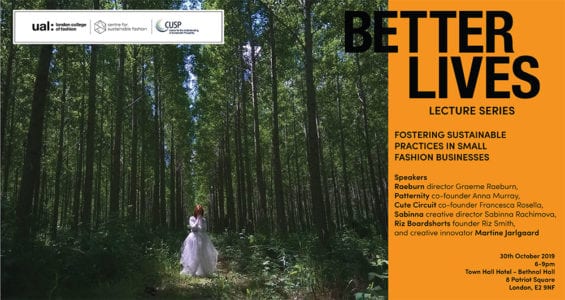Fashion as a Just Cause?
To explore pathways to accelerate change, a group of sustainable businesses were brought together recently, exploring how Micro and Small enterprises can, and do already, disrupt the fashion sector. CUSP researcher Patrick Elf attended the project workshop, and here shares some of his reflections.

The fashion industry is considered to be the second most polluting industry in the world. But progress is slow and unsustainable practices are still greatly dominating the industry. So estimated The Guardian earlier this year that Britons spend £2.7bn own more than 50m summer outfits—that will be worn only once! Whereas public concern about climate change reaches record levels and, fast fashion continues to grow amidst consumer outrage of unethical practices.
Exploring sustainable alternatives
To explore pathways to accelerate change, a group of sustainable businesses were brought together at the beautiful Townhall Hotel in Bethnal Green, end of October for the latest in the Better Lives series. The event was organised by the Centre for Sustainable Fashion (CSF) at London College of Fashion together with CUSP and CEEDR, and is part of our research that seeks to foster sustainable practices in the fashion sector.
In line with our research aims, the event explored how Micro and Small enterprises (MSEs) can, and do already, disrupt the fashion sector. The evening’s speakers included Graeme Raeburn from Raeburn, Anna Murray, co-founder of Patternity, Francesca Rosella from Cute Circuit, Sabinna Rachimova from Sabinna, as well as Riz Smith from Riz Boardshorts and creative innovator Martine Jarlgaard. Following a brief introduction to the research project; and bite-sized presentations introducing the respective businesses, the panel discussion opened—the incredibly diverse range of approaches to sustainability that we have been presented with made sure a lively debate ensued.
The Just Cause
One of the first questions addressed potential strategic advantages over bigger fashion companies in the field. It was agreed that a ‘general curiosity and a curiosity to do things differently’ were key to running a small sustainable fashion business—and a mindset that requires to ‘be fearless’. When the panellists were asked what single main action they would like to see in order to help put the fashion sector and clothing industry as a whole on a more sustainable path, the panellists’ responses uncovered some of the things that need fundamental improvement within the current fashion world:
- regulations (including a carbon tax)—indicating that current laws are far too lax and need to be updated;
- transparency—linked to regulations, indicating that a lot of practices are often obscure and don’t necessarily show which impact they have, thus not allowing the consumer to make informed decisions;
- refocus on quality—indicating the trend to produce more while lower quality became the norm. This has also implications for fashion businesses that seek to extend the lifetime of their products and become circular;
- reconnecting with nature—indicating a lost connection between us humans and nature that provides all resources that are needed to produce fashion products and, more generally, to sustain life on earth;
- resetting the system—summarising the both complexity and scale of the overarching systemic challenge.
The thing that struck me most, was that all small businesses on stage follow what Simon Sinek calls in his latest book The Infinite Game a Just Cause. Although the specific causes clearly differed, it was obvious that they motivated them and allowed them to focus their energy on a vision, a purpose and/or a north star if you like, directing their ambitions. Friction between them though? Not at all.
Instead, another similarity was that their primary ambitions were not driven by money or other extrinsic motivators. In fact, none of the panellists understood growth as a metric (or at least not as the most important metric) for success. On the contrary, all panellists highlighted the importance of their Just Cause to contribute to transparent and fair production and labour practices, avoiding as much waste as possible, among many other things. Moreover, the capability to live their creativity and maintain control over the business was mentioned as a key component of business operations, that would seek to avoid ‘ethical fading’—an erosion of the ethical standards in businesses often triggered through growth focused ‘key performance indicators’ (KPIs). Perhaps unsurprisingly, I as part of the audience did not have a single second the impression that they see each other as competitors trying to outdo each other. Instead, a profound respect for each other was noticeable. Something Sinek calls ‘Worthy Rivals’ that allow each other to be inspired, learn from one another and be better. (Note that I use the word better instead of best.)
To lead the way into a more prosperous future that allows us to live better lives, it is of key importance to adapt a quality mindset. A mindset that does not aim to be more, to eliminate other businesses in the industry, but to be better. Better to help people live better lives, one that allows us to be fearlessly curious and help to connect the dots. A mindset that understands that there can be strength in numbers, and that it’s only possible to tackle the prevailing unsustainable practices through alternative approaches when it is reaching the many.
Even though it is still early days, our research has already generated some fascinating insights. This event was the first in a row of events that will continue to provide insights into how small businesses can support humans to live better lives. Stay tuned.



